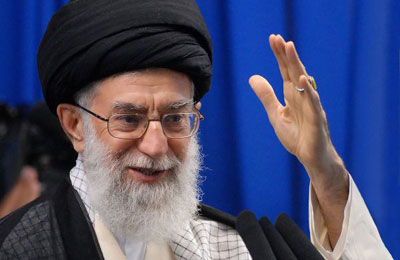
West intrigued by Khamenei's 'flexibility' talk
Dubai, September 18, 2013
Talk by Iran's Supreme Leader of "flexibility" days before his government's debut at the UN General Assembly in New York suggests a new willingness at the highest level to explore a compromise solution to Tehran's nuclear row with the West.
Western governments are intrigued, but wary.
It is unclear how much bargaining room Ayatollah Ali Khamenei, an unyielding promoter of Iran's nuclear programme, would allow his negotiators, whether in secret talks with Washington or in multilateral dicussions with major powers.
But the timing of his remarks, days before his new president and foreign minister meet Western officials on the sidelines of the annual UN General Assembly, sends a message that the West should expect, and reciprocate, a new desire to clinch a deal.
His comments, to an audience of the Revolutionary Guards, were also aimed internally, signalling to powerful security hardliners at home that they should not seek to torpedo any forthcoming attempt at negotiations, diplomats and analysts say.
Khamenei was quoted by ISNA news agency as saying: "I agree with what I years ago called heroic flexibility, because this is sometimes a very good and necessary move but with sticking to a basic condition."
"Sometimes a wrestler shows flexibility for technical reasons but he doesn't forget who his opponent is and what his real goal is."
HARDLINE OPPONENTS
To one Iran expert, Baqer Moin, the speech was exceptional. It "opens a new chapter in Iranian internal and external relations and may prove to be as important as Ayatollah Khomeini's acceptance of the ceasefire with Iraq in 1988."
UK-based writer Moin said Khamenei wanted to create political space domestically for new President Hassan Rouhani, elected in August, to solve the dispute and end sanctions.
"Rouhani can now negotiate with the US without worrying that he might be undermined by his hardline opponents," he said.
Mehran Kamrava, an Iran expert at Georgetown University in Doha, said Tehran perceived a window of opportunity for meaningful negotiations.
His remarks were a signal to other actors in the political system not to undermine Rouhani's efforts, Kamrava said. "This is one of those signals that, whatever Rouhani's engaging in, is done with the support and blessing of the highest levels of the political system."
Initial reaction from Western officials was cautious.
Ten years of talks between Tehran and world powers on Iran's nuclear activities, eight of them during the term of former hardline president Mahmoud Ahmadinejad, ran continually aground, bereft of mutual confidence and dogged by historical suspicions.
The US and its allies believe Iran is seeking a nuclear weapons capability, and have imposed sanctions aimed at stopping it. Iran denies it wants a bomb and says its nuclear program has peaceful aims.
"All the signs of change in direction need to be grasped, but what counts are acts. We are not there yet and need to be attentive," said a French diplomatic source.
A CHANGE IN TACTICS ONLY?
A Tehran-based diplomat said there had been a significant change of mood in the government but the real question was whether Rouhani would bring any new initiative to New York.
"Khamenei's words indicate that Iran may have a bit of space to compromise but it's very unclear how much that will be. It's unclear whether this is a change in negotiating tactics or preparing for Iran to compromise," the diplomat said.
The Western message that Iran's more conciliatory language needs to be backed up with concrete action was underlined by the United States, France, Britain and others at this week's annual gathering of the International Atomic Energy Agency in Vienna.
Speaking to reporters on Monday after the head of Iran's Atomic Energy Organization, Ali Akbar Salehi, said he saw an "opening" in the nuclear dispute, US Energy Secretary Ernest Moniz, said: "The proof will be in the pudding. The words have to be followed by concrete action."
Rouhani and Foreign Minister Javad Zarif do not have carte blanche to cut a deal -- any agreement would have to be approved by Khamenei -- and in any case they must first settle the arrangements under which any new talks would happen.
But diplomats and Iran watchers said that, after the often fractious Ahmadinejad years, the new tone was refreshing, and that was important for encouraging discussion and communication. - Reuters







